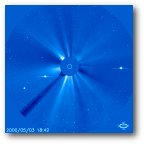|
SOHO
The
@stro object for the week of 05/01/2000
 |
|
images
courtesy of SOHO
|
Solar and
Heliospheric Observatory. The
Solar and Heliospheric Observatory, or SOHO, is a solar research
satellite jointly operated by the European Space Agency and NASA.
It has helped us to understand the interactions between the Sun
and the Earth's environment better than has been possible to date.
SOHO was
pushed up through and out of our atmosphere by a two stage Atlas-IIAS
rocket on December 2, 1995. SOHO operates from a position 1.5 million
kilometers ahead of the Earth in a halo orbit around the "L1
Lagrangian point" resulting in an uninterrupted view of the
Sun.
The Science
SOHO contains
several scientific instruments and cameras from which it captures
images of the Sun. These cameras take pictures in H-Alpha, Iron,
Calcium, the visible spectrum and other wavelengths of the spectrum.
In addition, the onboard science packages are studying the solar
interior, exterior, atmosphere, and solar wind. SOHO
instruments produce a data stream of up to 200 kilobits per second
that can be transmitted continuously to the DSN stations of Goldstone
(USA), Canberra (Australia) and Madrid (Spain), when each is visible
from SOHO due to the daily rotation of the Earth. Data from SOHO
is also used to provide warnings of impending solar storms that
might affect communications and other electrical equipment here
on Earth.
SOHO as a
Planetary Telescope
 |
|
image
courtesy of SOHO
|
You've probably
already heard that several of the planets are within 25 degrees
of each other in the sky from our perspective on and around May
5th, 2000 (and no - our planet will not self-destruct as a result).
We can't see this alignment because it is occurring on the other
side of the Sun from us, but we can view some of the planets with
the help of SOHO (as of 05/03/2000). Go to http://sohowww.nascom.nasa.gov/data/realtime-images.html
select the LASCO C3 image. According to Dennis Mammana of the Reuben
H. Fleet Science Center the bright planets in the image are Saturn,
Jupiter and Mercury from left to right respectively. You can also
check out the MPEG movie page at http://sohowww.nascom.nasa.gov/data/realtime/mpeg/
and select C3 and view the planets actually moving in their orbits
or you can download one of the example movies by clicking
here (credit SOHO).
| Current
information for SOHO: |
| Mass: 610
kg |
| Length:
3.65 m |
| Width:
3.65 m |
| Width with
solar cells deployed: 9.5m |
For more
information visit:
Official
SOHO page...
Real-time
SOHO images...
More
on the mission...
SOHO
Science operations...
|